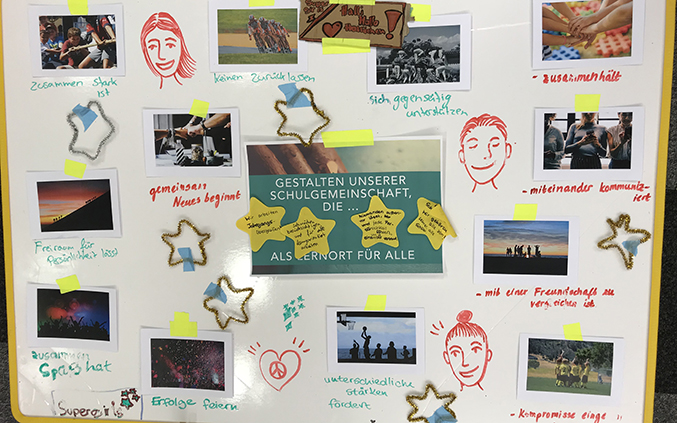Creating the school of the future
To prepare pupils for a more and more networked and digital world, schools have to rethink their teaching approaches and integrate new educational concepts. Instead of fact-based learning, schools should foster competencies such as collaboration skills, empathy and creativity. This is where Design Thinking comes into play. Although the innovation approach has been mostly used by companies and organizations, some committed schools and teachers have recognized its potential. One of them is the new Montessori School in Potsdam.
This year the HPI D-School has started a collaboration with the Montessori School to co-design the school’s learning environment and to shape its educational concept by making use of the Design Thinking mindset.
The new Montessori School in Potsdam opened its doors in August 2018 and will be the future home of more than 1.000 pupils in grades 1-12. Its new building especially offers many opportunities to create the school’s future. In February 2019 pupils and teachers of the grades 7 and 11 will move in. Until then they will collect many ideas and create concepts for the design of the new school.
The first joint project with the challenge “Design our school community as a place of learning for everyone” kicked-off in November with a workshop at the Montessori School. Led by Dr. Claudia Nicolai and Samuel Tschepe as well as nine coaches from the network of the HPI D-School, pupils and teachers will be empowered to co-design their environment and learning concept for their school of the future in three workshops.
The first joint workshop already provides interesting insights for the coaches of the HPI D-School. The pupils are motivated, deliberate and work independently in teams.
In small teams they learn how to define problems and develop empathy by conducting interviews. Many of the pupils soon recognize the advantages of the Design Thinking mindset. “For me, the experience of failure was very interesting. In other subjects you make a mistake and have to deal with it. Here a mistake is just part of the process”, Lasse realizes. Amelie likes “that the groups were mixed and thus numerous perspectives were visible”. Pupils like that Design Thinking is fun, gives space for creative ideas and independent working. “It was really cool. We could unfold our creativity and be really colorful”, says Luca. The applied techniques also helped pupil Alma to structure her thoughts.
The aim of the workshops is to show the advantages of project-based learning across disciplines. Pupils develop competencies to promote responsibility for their own learning and development process.
At the end of the workshop series pupils and teachers of the Montessori School want to implement the concept ideas immediately and find new challenges for the second half of the school year. A central question will be how to further develop this Design Thinking-learning approach as an ongoing activity for the next generations of pupils and teachers alike. The HPI D-School will continue to accompany the Montessori School on this journey.

